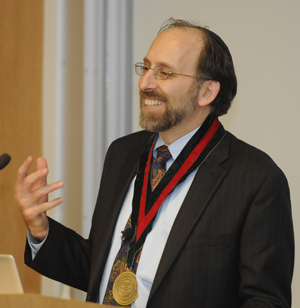
Richard L. Axelbaum, PhD, professor of energy, environmental & chemical engineering in the School of Engineering & Applied Science, is the new Stifel & Quinette Jens Professor in Environmental Engineering Science.
He was installed Oct. 31 by Chancellor Mark S. Wrighton in a ceremony in Brauer Hall.
“Rich has been a tremendous faculty member, very creative, and creative in several dimensions,” Wrighton said. “I especially appreciate his leadership in the establishment of the Consortium for Clean Coal Utilization, but beyond that he has also been a key contributor in the development of programs in materials science and in efforts to improve our success in innovation and entrepreneurship.
“Rich has been involved in the founding of two companies and has been very inspirational in this regard,” Wrighton said.
After Wrighton’s remarks, Ralph S. Quatrano, PhD, dean of the School of Engineering & Applied Science, introduced Axelbaum.
“With input from leaders around the world, the U.S. National Academy of Engineering has identified key challenges for the 21st Century — many of which relate to developing environmentally sustainable and affordable technologies,” Quatrano said. “Our school is taking a global leadership role in addressing these challenges, and I am grateful to Rich for his significant contributions in this effort.”
Axelbaum is the director of Consortium for Clean Coal Utilization and heads the Laboratory for Advanced Combustion and Energy Research.
He served as the associate director of the Center for Materials Innovation from 2005-08 and directed the engineering section of the NASA Missouri Space Grant Consortium at WUSTL from 1997-2009.
From 1998-2007, he was chairman and chief scientific adviser for AP Materials Inc., a startup company he founded that specialized in flame synthesis of nanopowders.
Cabot Corp. acquired the company assets and technology in 2007.
Recently, Axelbaum has been involved in the start up of another company, Xtend Energy, which will help address the cost and performance issues of electric-vehicle batteries by making ultra-high-performance materials for lithium-battery cathodes.
In addition to his regular teaching schedule, Axelbaum has developed an innovative short course on energy and the environment that is offered to both students and industry.
Axelbaum studies combustion phenomena, ranging from oxy-coal combustion to flame synthesis of nanomaterials. His work on fossil fuel combustion focuses on understanding the formation of pollutants, such as soot, in order to develop novel approaches to eliminating them.
In response to global concerns over carbon dioxide emissions, he has begun developing approaches to carbon capture and storage (CCS).
Axelbaum’s materials research also has yielded methods of synthesizing — in flames — stable metal nanoparticles and single-walled carbon nanotubes. He currently is working on the synthesis of long-life battery materials for electric vehicles.
Axelbaum earned a bachelor of science degree in mechanical engineering from Washington University, and a master of science and doctorate, also both in mechanical engineering, from the University of California, Davis.
He returned to WUSTL in 1990 as an assistant professor in mechanical engineering and became professor of energy, environmental & chemical engineering in 2008.
Stifel & Quinette Jens
The endowed chair is the culmination of Stifel Jens’ lifelong dedication to the twin goals of improving the environment and supporting the engineering school.
Stifel Jens earned a bachelor’s of science and a master’s of science, both in civil engineering, from WUSTL in 1932 and 1933; he died in 1995. Quinette Cowan Jens graduated from the College of Arts & Sciences in 1931; she died in 1997.
After graduation, Jens joined the firm of W.W. Horner and Human Shifrin, and soon developed a reputation as an expert in hydraulic, hydrologic, sanitary and drainage systems.
During the 1930s and ’40s, Jens served as a principal consultant in a nationwide study of drainage basins, as a designer of the storm drainage system for National Airport in Washington, D.C., and as a designer of the Houston water system.
In 1963, he co-founded the firm of Reitz and Jens. That same year he co-founded the American Society for Civil Engineers’ Urban Water Resources Council.
In 1970, Jens received a presidential commendation for his contributions to environmental excellence. He also received many awards from WUSTL: the Alumni Citation in 1973, the School of Engineering Alumni Achievement Award in 1985 and the Robert S. Brookings Founders Day Award in 1993.
The Jenses made many significant contributions to the School of Engineering & Applied Science, among them two endowed professorships, an environmental laboratory and graduate fellowships–all in environmental engineering.